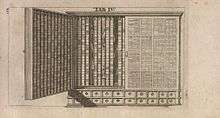Vincent Placcius
Vincent Placcius (1642-1699) was a German writer, professor, jurist and polymath.
Vincent Placcius | |
|---|---|
| Born | 1642 |
| Died | 1699 |
| Nationality | German |
| Occupation | Writer, professor, jurist and polymath |
Life
He was born in 1642 and died in 1699.
He was a professor of morals and eloquence for twenty-four years.
Works

He is chiefly remembered for his work "The Art of Excerpting" which in its day could be considered to be a precursor to the computer hard disk.[1][2] [3]
Several of his works have been auctioned for huge sums by Christie's.[4]
Excerpts
John Gorton's General Biographical Dictionary provides the following information about Vincent Placcius:[5]
Vincent Placcius, a learned jurist, was born at Hamburg in 1642. He studied at Helmstadt, and after travelling in France and Italy, he returned to his native city, where he practiced at the bar, and was appointed professor of morals and eloquence, which post he held until his death in 1699. His principal work is a curious bibliographical piece respecting anonymous and pseudonymous writers, entitled "De Scriptis et Scriptoribus anonymis atque pseudonymis Syntagma".
Alexander Chalmers' General Biographical Dictionary provides the following information about Vincent Placcius:[6]
Vincent Placcius was an eminent philologer of Hamburgh, where he was born in 1642, completed his studies at Helmstadt and Leipzig, and improved his talents by travelling in France and Italy. When he returned, he applied himself to the bar, and afterwards became professor of morals and eloquence, in which situation he continued twenty-four years. He was beloved by his pupils, and when he died, April 6, 1699, regretted by his countrymen in general, who had considered him as an oracle. His works are, 1. “A Dictionary of anonymous and pseudonymous Authors,” published in 1708, in 2 vols. folio, by the care of Fabricius a curious work, but abounding with faults, 2. “De jurisconsulto perito Liber,” 1693, 8vo. 3. “Carmina juvenilia,” Amst. 1667, 12mo. 4. “De arte excerpendi,” Hamburgh, 1689, 8vo, with several others, all testifying, and abundantly proving, his talents and erudition.
References
- "Taking note: Harrison, Placcius, Leibniz, and the Arc of Studies". Takingnotenow.blogspot.in. 2009-04-20. Retrieved 2012-07-26.
- "A wooden hard drive « Richard Littledale's Preacher's A – Z". Richardlittledale.wordpress.com. 2012-01-08. Retrieved 2012-07-26.
- Cf. Alberto Cevolini, De arte excerpendi. Imparare a dimenticare nella prima modernità. Florence, Leo S. Olschki, 2006.
- "PLACCIUS, Vincent (1642-1699). Theatrum anonymorum et pseudonymorum, ex symbolis & collatione virorum per Europam doctissimorum ac celerrimorum Hamburg: Spieringk for G. Liebernickel, 1708. | Christie's". Christies.com. Retrieved 2012-07-26.
- A general biographical dictionary - John Gorton - Google Books. Books.google.co.in. Retrieved 2012-07-26.
- "1812 Chalmers' Biography / P / Vincent Placcius (1642–?) vol. 25, p. 31". Words.fromoldbooks.org. Retrieved 2012-07-26.
External links
| Wikimedia Commons has media related to Vincent Placcius. |